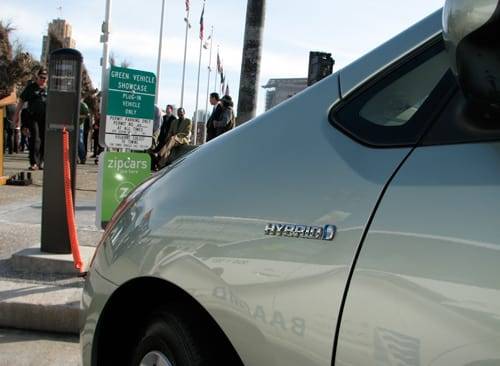Study Rates 50 U.S. Cities for EV Readiness


Leaders
- Austin, Texas
- Denver
- Los Angeles
- New York
- Orlando, Fla.
- Phoenix
- Portland, Ore.
- Raleigh, N.C.
- Riverside, Calif.
- Sacramento, Calif.
- San Diego
- San Francisco
- San Jose, Calif.
- Seattle
Aggressive Followers
- Detroit
- Houston
- Indianapolis
Fast Followers
- Atlanta
- Baltimore
- Chicago
- Dallas
- Kansas City
- Las Vegas
- Minneapolis
- Providence, R.I.
- San Antonio
- St. Louis
- Tampa, Fla.
Followers
- Birmingham, Ala.
- Boston
- Buffalo, N.Y.
- Charlotte, N.C.
- Cincinnati
- Cleveland
- Columbus, Ohio
- Hartford, Conn.
- Jacksonville, Fla.
- Louisville, Ky.
- Memphis, Tenn.
- Miami
- Milwaukee
- Nashville, Tenn.
- New Orleans
- Oklahoma City
- Norfolk, Va.
- Pittsburgh
- Philadelphia
- Richmond, Va.
- Salt Lake City
- Washington, D.C.
*Cities within each category are listed alphabetically
As expected, the Leaders group is dominated by cities that adhere to the California Air Resources Board’s stringent emissions requirements, which enjoy early attention from automakers like Chevrolet and Nissan as they roll out their plug-in cars gradually to U.S. markets.
“The list of cities that is actively working and aggressively preparing to accommodate and facilitate the rollout of electric vehicles is a much longer list than it was just 12 months ago,” said Antonio Benecchi of Roland Berger during last week’s Business of Plugging In conference in Detroit. “Twelve months ago, I think everybody, including us, was still talking about the usual suspects — the large cities in the coastal areas, Los Angeles and Portland and San Francisco — which are clearly the leaders, ahead of everybody else because they’ve spent years at this.” To be clear, however, Benecchi said, “Forty percent of the 50 cities have done very little.”
The Leaders excelled in most or all of the study’s general areas: infrastructure, regulatory environment, consumer readiness and overall operating environment, the last of which covers everything from energy prices and garage availability to weather and commute distances. It doesn’t hurt that Denver, San Francisco and San Jose are among the five wealthiest cities by annual income, but that’s not the driving force. The other two most wealthy, Boston and Washington, are in the lowest-ranked group, Followers.
Overall, the infrastructure considerations put less emphasis on public charging stations. “It’s probably less important than it was perceived just a year ago to have a lot of them,” Benecchi said. “The clear consensus is that the priorities are home, work, public. There’s a lot more attention on enabling the home charging.”
In the past, pilot programs have proved home charging to be less of a no-brainer than one might assume. There were some obstacles even among early adopters who gladly pay — sometimes handsomely — to install charging devices in their garages and possibly upgrade electrical service. The largest pilot program in the U.S. to date was Mini’s leasing of 450 Mini-E battery-electric cars in the New York area starting in April 2009. Some customers had trouble obtaining an installation permit because it was a new type of request and because Mini’s charging station wasn’t approved by Underwriters Laboratories, so some inspectors refused to sign off.
Matt Mattila of the Rocky Mountain Institute said these early lessons are paying dividends for other cities. His organization’s Project Get Ready communicates monthly with representatives from a dozen municipalities. “Our cities said, ‘Huh, that’s interesting.’ In our next [conference] call a month later, Portland and Raleigh both said they’re shooting for 24-hour permitting turnaround,” Mattila said. “Then a half-dozen other cities said they’re working for streamlined permitting, and then you even had the automakers and the charging station providers come out and say, ‘Look, we’re going to try and take this pain point away from the customers and have a really streamlined program going forward.’
“It’s really up to the automakers christening a city and saying you’re an early EV city and we’ll get you cars,” Mattila said. “Lots of places say we’ve got a plan, and we think it’s important. Forty percent of cities have not even started thinking about how to build out their infrastructure. That’s OK. You don’t want cities to start blanketing charging stations just because they know it’s a critical part of having EV success. The way we rank this one is not only how many charging stations you have, but do you have a strategic plan.”
Benecchi added, “If there was any doubt, it’s very clear right now how important and fundamental the role of cities and municipalities and local government is to make this all happen.”
The study highlights some cities for best practices. Portland, Raleigh and San Francisco provide instant permits for residential charging installations. Denver offers up to a $6,000 state incentive for buying an electric car. San Francisco is stimulating the market by committing to electric vehicles for its municipal fleet, up to 25% by 2018. Portland is doing the same by committing up to 10% of vehicle miles traveled to be in EVs by 2020. San Francisco plans for 2,000 public charging stations “in the near term,” and Baltimore, Houston, Los Angeles, Orlando and Raleigh are offering free or discounted electric rates.
The cities with the most favorable energy costs — high gasoline and relatively low electricity prices — include Chicago, Louisville, Pittsburgh, Salt Lake City and Seattle, according to the study. Of the five, only Seattle can expect any relief soon; the other four are just followers.

Former Executive Editor Joe Wiesenfelder, a Cars.com launch veteran, led the car evaluation effort. He owns a 1984 Mercedes 300D and a 2002 Mazda Miata SE.
Featured stories




